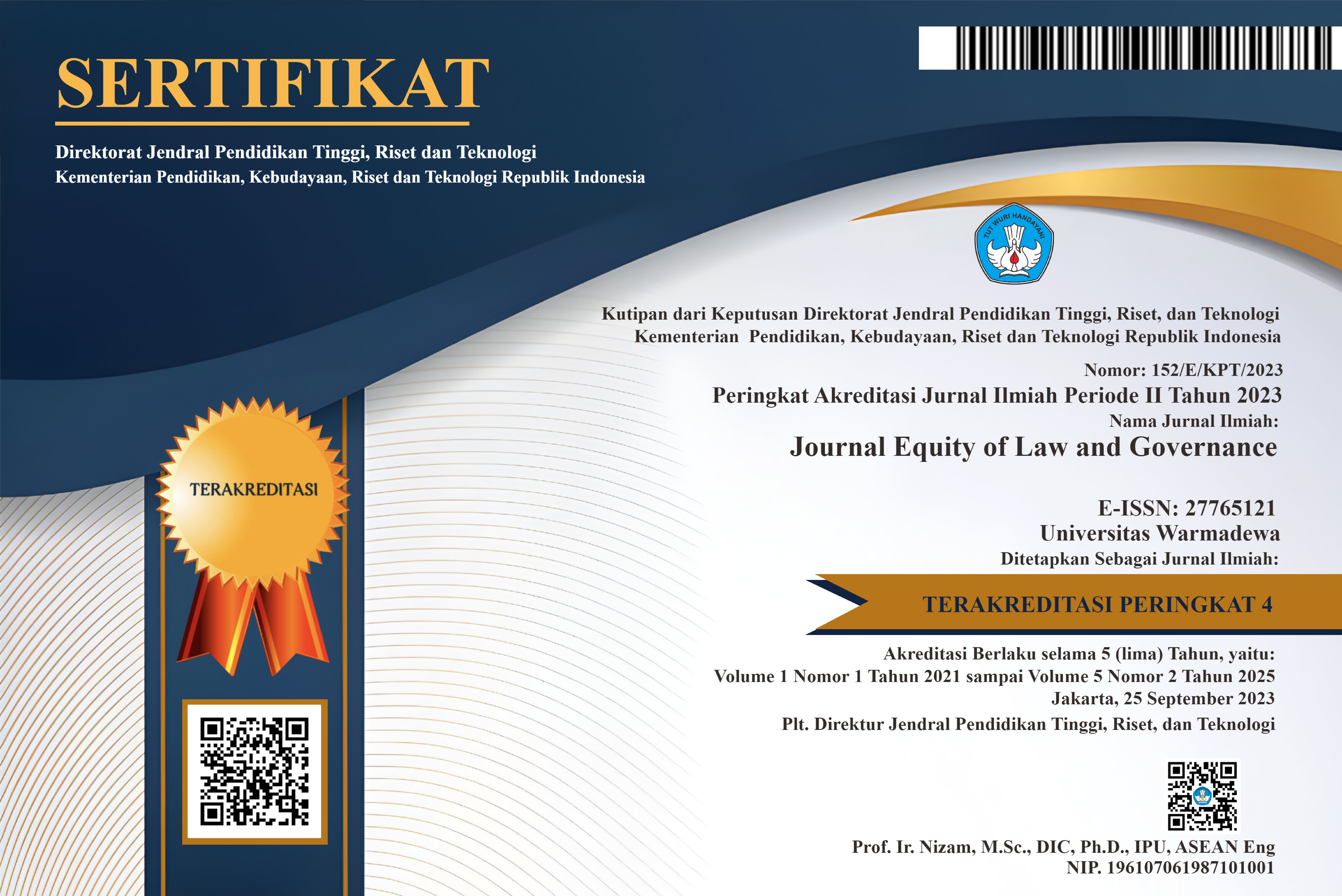Protecting Well-Known Marks Related to Territorial Principle: From Substantive Similarity to the Distinctiveness Theory
Abstract
Well-known marks are vulnerable to violations, including in Indonesia. Registered trademark disputes often occur between well-known and local mark owners regarding substantive similarities with well-known marks. Ironically, the dominant dispute resolution protects local marks with the rationality of mark protection based on Territorial Principles. The purpose of this study is to clarify how well-known marks are protected related to the exception applying the Territorial Principle to substantively similar marks and to examine the advantages of the Distinctiveness Theory for more legal certainty. The study used a normative legal research method. Study reveals that the Territorial Principle applies to mark protection through Article 6 of the Paris Convention, Article 15 of TRIPs, Article 3 of Indonesian Law No.20/2016 on Mark and Geographical Indication. Protection of Well-Known Marks is excluded from the Territorial Principle as agreed in 1925 by member countries of the Paris Convention. The exception arrangements are through Article 6bis of the Paris Convention, Article 16 of the TRIPs Agreement, and Article 21 of Law No.20/2016. Marks that are substantively similar with similar elements in visuals, phonetics, and concepts are important for mark examiners, law enforcers, and the public to understand. Understanding the mark distinctiveness theory from the weakest to the strongest, namely: Generic, Descriptive, Suggestive, Fanciful, and Arbitrary as an alternative solution for advantages in mark registration. That will also minimize mark disputes. Good faith in the mark registration is referring to uniqueness theory, it is able to differentiate items or services.
References
Balqis, W. G., & Santoso, B. (2020). Arti Penting Perlindungan Merek Terdaftar Bagi Komunitas Penghasil Produk Ekonomi Kreatif. Jurnal Pembangunan Hukum Indonesia, 2(2), 205–221.
Blakeney, M. (2003). The Protection Of Well-Known Marks (Wipo National Seminar On Intellectual Property Organized By Wipo And Cairo University).
Dharmawan, N.K.S., Kasih, D.P.D., Dewi, A.A.I.A.A.A., Kurniawan, I. G.A., Pranajaya, M. . (2020). Trademark Protection For Small-Medium Enterprises In Bali: Strengthening Community-Based Tourism In The Era Of Fourth Industrial Revolution. Journal Of Legal, Ethical And Regulatory Issue, 23(0), 1–18.
Direktorat Merek Dan Indikasi Geografis, Direktorat Jenderal Hak Kekayaan Intelektual, K. H. D. H. A. M. (2020). Petunjuk Teknis Pemeriksaan Substantif Merek.
Faris, J. (2008). The Famous Marks Exception To The Territoriality Principle In American Trademark Law. Case W. Res. L. Rev., 59, 451.
Kartawidjaya, J. (2017). Penerapan Persamaan Unsur Pokok Dalam Sengketa Merek Terkenal Berdasarkan Undang-Undang Nomor 15 Tahun 2001 Tentang Merek (Analisis Putusan Mahkamah Agung Nomor: 022. K/N/Haki/2002). Dinamika Hukum, 8(1).
Landes, W. M., & Posner, R. A. (1987). Trademark Law: An Economic Perspective. The Journal Of Law And Economics, 30(2), 265–309.
Mckenna, M. P. (2007). Teaching Trademark Theory Through The Lens Of Distinctiveness. . . Louis Ulj, 52, 843.
Medina, D., & Enggriyeni, D. (2023). Pengaturan Dan Penerapan Prinsip Teritorial Dalam Perlindungan Indikasi Geografis Indonesia (Dalam Perspektif Hukum Internasional Dan Nasional). Unes Law Review, 6(1), 25–34.
Nichols, C. D. P. (2020). Article 6bis Of The Paris Convention For Well-Known Marks. Indiana International & Comparative Law Review, 30(2), 235–249.
One Village One Brand Untuk Wujudkan Merek Unggulan Dari Setiap Desa Di Indonesia. (N.D.). 8 May 2023. Retrieved October 17, 2024, From Https://Www.Dgip.Go.Id/Index.Php/Artikel/Detail-Artikel-Berita/One-Village-One-Brand-Untuk-Wujudkan-Merek-Unggulan-Dari-Setiap-Desa-Di-Indonesia?Kategori=Liputan-Humas
Rofik, A., & Sari, N. K. (2024). Perlindungan Hukum Terhadap Pemboncengan Merek Terkenal (Passing Off) Starbucks Melalui Pendaftaran Merek Di Indonesia (Analisis Putusan Nomor 836 K/Pdt. Sushki/2022). Lex Economica Journal, 2(1), 24–34.
Roisah, K. (2015). Kebijakan Hukum “Tranferability” Terhadap Perlindungan Hak Kekayaan Intelektual Di Indonesia. Law Reform, 11(2), 241–254.
Simon, D. A. (2020). Trademark Law & Consumer Safety. Fla. L. Rev., 72, 673.
Sulasno, I. Z., Sutarya, R. P. A., & Syaharani, T. A. (2023). Sengketa Persamaan Merek Pada Pokoknya Antara Pt Pstore Glow Bersinar Indonesia Dengan Pt Kosmetika Global Indonesia Dan Pt Kosmetika Cantik Indonesia (Studi Kasus Putusan Nomor 2/Pdt. Sus. Hki/Merek/2022/Pn. Niaga Sby). Padjadjaran Law Review, 11(2), 150–159.
Utama, Y., Permata, R. R., & Mayana, R. F. (2021). Pelindungan Merek Berbasis Tingkat Daya Pembeda Ditinjau Dari Doktrin Dilusi Merek Di Indonesia. Acta Diurnal Jurnal Ilmu Hukum Kenotariatan, 5(1), 139–153.
Wahyuni, W. (N.D.). Memasuki Tahun Merek, Kemenkumham Imbau Masyarakat Melek Merek. 2 Pebruari 2023. Retrieved October 17, 2024, From Https://Www.Hukumonline.Com/Berita/A/Memasuki-Tahun-Merek--Kemenkumham-Imbau-Masyarakat-Melek-Merek-Lt63db8287c1c8c/?Page=All
World Intellectual Property Organization Geneva 2000, Joint Recommendation Concerning Provisions On The Protection Of Well-Known Marks, At The Thirty-Fourth Series Of Meetings Of The Assemblies Of The Member States Of Wipo September 20 To 29, 1999. (N.D.).
 Abstract viewed = 0 times
Abstract viewed = 0 times
 pdf downloaded = 0 times
pdf downloaded = 0 times













